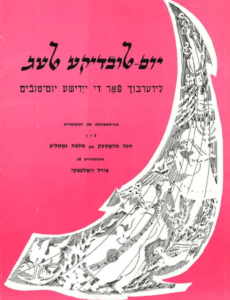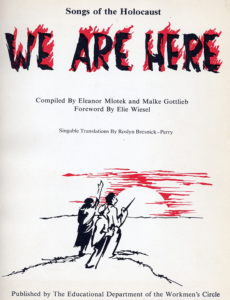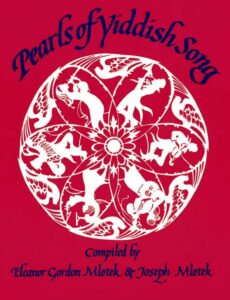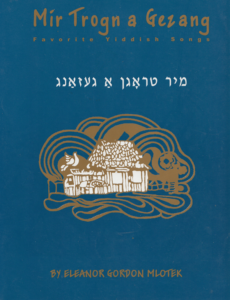Discover the Music
Browse through each song book or search the entire collection.
Search
Zishe Breytbard
Song transmitted by Tova Blum Dobkin which she collected from Isaac Milstein, Brooklyn, N. Y., published October 20, 1974 in the Perl. Zishe Breitbard (1883-1925) was the youngest son of a Jewish blacksmith in Lodz, Poland, whose prodigious strength brought him fame throughout the world. He presented his feats of strength in theatres of Warsaw, in all capitals of Europe, and also in New York, at the Orpheum and Palace Theaters. The world press hailed him as the “Iron King,” the “Polish Apollo,” the “Superman of Strength” and the, “Modern Samson.” At one performance he banged a nail with his hand (the song states that the nail went into his right foot) and he contracted blood-poisoning from which he died. The New York Times of October 16, 1925 devoted an editorial to his death, comparing him to the great and legendary strong men of history.
Part of the melody of this song is adapted from the song “Reyzele dem shoykhets” (Reyzele, the Ritual Slaughterer’s Daughter), words by Z. Segalovitch, which in turn was based on the Italian song Sorrento.
Other songs about Zishe Breitbart were submitted by A. Edelman (Los Angeles), Irene Goldberg (Forest Hills, N. Y.) and Hershl Altman (Bronx, N. Y.).
Zmires
Zog Maran
Song about Marranos, Spanish Jews forced to convert during the inquisition in the 15th and 16th centuries, who practiced Jewish rituals in secret. Words by Yiddish poet Avrom Reyzen (1875-1953); music by Samuel Bugatch (1889-1984). Printed in sheet music by Mills Music, Inc., N.Y., 1962.
Zog Nit Keyn Mol
Written in the Vilno ghetto, the song became the anthem of the underground resistance movement. Later it spread to other ghettos and partisan divisions. Today it is sung at all commemorative gatherings. It was written by Hirsh Glik (see note about author in Shtil Di Nakht). He set the words to a melody by the Russian composer Dmitri Pokrass. It is also known as Partizaner Himen (Partisan Song).
Zog Nit Keyn Mol!
Zog, Maran
Zol Nokh Zayn Shabes
Zol Shoyn Kumen Di Geule!
Text by Shmerke Kaczerginski (1908-1954), Vilna poet, folklorist and partisan fighter. Kaczerginski was among the first to collect and publish the songs of the ghettos and concentration camps. The song, written right after the holocaust, expresses the eternal hope and longing for salvation. The song was published in the Kaczerginski Memorial Volume in Argentina in 1955. Kaczerginski was killed in a plane crash in 1954. In a manuscript sent to the compiler of this book, before his death, he noted that the music of the song is by Rabbi Abraham Isaac Kook. Sidor Belarsky also wrote music to the poem.
The premise of this upbeat song is, the Messiah will come when there is either a completely righteous or a completely wicked generation. So, in our times [says the poet ironically, with a glass of booze in hand], sinning will actually bring Moshiekh sooner!
Zol Zayn
Text and melody by I. Papernikov, written in the early 1920’s. In his book Heymishe un Noente (Tel Aviv, 1958), the author describes how he composed the melody to the poem. He notes that he only wrote two stanzas; a third stanza that appears in some publications was added by the singer, Vitalina.
Zol Zayn Shabes
Zolst Azoy Lebn
An old folk song from Warsaw, published in 1928 by Y.L. Cahan, with parts of the text already recorded in 1888. In her lecture recitals, the folklorist Ruth Rubin has aptly called this, “The Song of the Babysitter,” to convey its continuing and timely sentiment. Parts of this song were at various times a love song as well as a lullaby and also have international parallels.
Zumer Bay Nakht Oyf Di Dekher
Words by Louis Gilrod (1879-1930) set to an English song “On a Good Old Trolley Ride,” published in the Lider-magazin, no.19, Hebrew Publishing Co., 1908. The song was adapted during the Holocaust to become a song about forgetting for a while about ghetto and concentration camp life. It was submitted by Sonia Tencer, Montreal, who recounts that after the war, she met a girl in Stuthof, Germany, with whom she had lived through the liquidation of the Vilna Ghetto. The girl told Sonia that the following song was sung in the Camp in Kloge, Estonia:
“Zuntik bay nakht oyfn boydem/ lz dokh a vunderlekhe tsayt I Fargest on dem geto un lager/ Verst fun kloge bafrayt, / Dort kumt nit der saniteter I Me ken dortn ton vos men vil, / Me hot nit gelebt / Ver es iz nit geven / Zuntik bay nakht oyfn boydem” (Sunday night on the garret is such a wonderful time. You forget about the ghetto and camp, you become free of Kloge. There the inspector of the sick house doesn’t come. You can do whatever you want there. You haven’t lived, whoever has not been on the garret on Sunday night).







